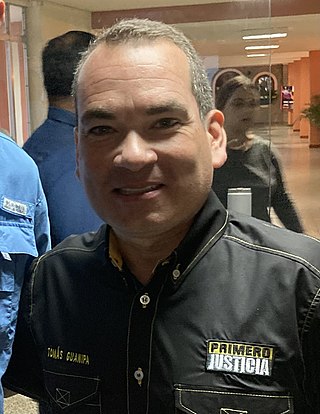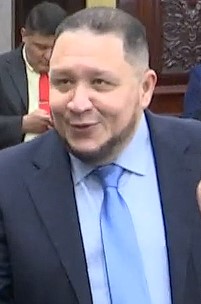
Julio Andrés Borges Junyent is a Venezuelan politician and lawyer. In the late 1990s he had a TV court show called "Justicia Para Todos" on Radio Caracas Televisión. He co-founded the party Primero Justicia in 2000 together with Henrique Capriles Radonski and Leopoldo Lopez.

María Corina Machado Parisca is a Venezuelan opposition politician and industrial engineer who served as an elected member of the National Assembly of Venezuela from 2011 to 2014. Machado was the founder and former leader of the Venezuelan volunteer civil organization Súmate, alongside Alejandro Plaz. In 2018, she was listed as one of BBC's 100 Women.

Henrique Capriles Radonski is a Venezuelan politician and lawyer, who served as the 36th Governor of Miranda from 2008 to 2017.

Presidential elections were held in Venezuela on 14 April 2013 following the death of President Hugo Chávez on 5 March 2013. Nicolás Maduro—who had assumed the role of acting president since Chávez's death—was declared winner with a narrow victory over his opponent Henrique Capriles, the Governor of Miranda. Capriles had run in the previous election less than a year before, losing to Chávez by an 11-point margin. This time the margin of victory was much smaller, and thus became the closest presidential election of the country since the 1968 election.

Henry Lisandro Ramos Allup is a Venezuelan politician and lawyer and former President of the National Assembly who was born in Valencia, Carabobo. He has been leader of the social democratic Democratic Action party, holding the position of Secretary-General.
Parliamentary elections were held in Venezuela on 6 December 2020. Aside from the 167 deputies of the National Assembly who are eligible to be re-elected, the new National Electoral Council president announced that the assembly would increase by 110 seats, for a total of 277 deputies to be elected.

Juan Requesens, a deputy of the Venezuelan National Assembly, was arrested as a suspect in the Caracas drone attack, an alleged assassination plot on the Venezuelan President Nicolás Maduro. The circumstances of his arrest and detention are controversial, and irregularities surround the legal proceedings. Requesens was imprisoned in El Helicoide from his arrest on 7 August 2018, with allegations of torture to coerce a confession, and delays impeding the legal process and hearings until his release on 28 August 2020.

Tomás Ignacio Guanipa Villalobos is a Venezuelan administrator and politician who served as a member of the National Assembly of Venezuela and is the current leader of the Justice First party.
Armando.Info is a Venezuelan investigative journalism website that was founded in 2014. Armando.info is a long-term partner of the International Consortium of Investigative Journalists and has worked on many projects, including the Panama Papers and Paradise Papers.

Presidential elections are scheduled to be held in Venezuela in 28 July 2024 to choose a president for a six-year term beginning on 10 January 2025. Leading candidates of the Venezuelan opposition have been disqualified from participating in the election during its campaign or in previous elections. In June 2023, the leading candidate María Corina Machado was barred from participating by the Venezuelan government for alleged political crimes. This move has been regarded by the opposition as violation of political human rights and has been condemned by international bodies like the Organization of American States, the European Union, and Human Rights Watch, as well as countries such as Canada, Chile, Colombia, Ecuador, France, Germany, Mexico, Paraguay, the United Kingdom, the United States and Uruguay.
Carlos Andrés García was a Venezuelan politician who served as councilor of Guasdualito, Apure, and who died while incarcerated by the Bolivarian Intelligence Service (SEBIN).
The 2020 Venezuelan National Assembly Delegated Committee election was to be held in the ordinary session of the National Assembly on 5 January, in which 160 deputies were to elect the legislature's board of directors for the year 2020–21: the president, the first and second vice presidents, the secretary and the deputy secretary. It was the last such election of the IV National Assembly.

Luis Eduardo Parra Rivero is a Venezuelan politician who was in a dispute with Juan Guaidó for a year over who was the President of the National Assembly of Venezuela based on a vote on 5 January 2020.

Operación Alacrán, also known as CLAP affair or PSUV-CLAP faction, is the name given to a corruption plot which was denounced in 2019 by the members of the National Assembly of Venezuela. It would have sought to avoid the re-election of Juan Guaidó on 5 January 2020 as President of the Assembly, by obtaining the support of opposing legislators in exchange for millions of dollars. Legislators would have been asked to vote against Guaidó, or to not attend the election and thereby break the necessary quorum.

The IV National Assembly of Venezuela was a meeting of the legislative branch of Venezuelan federal government, comprising the National Assembly of Venezuela. It is meeting in Caracas after 2015 Venezuelan parliamentary election.

José Dionisio Brito Rodríguez is a Venezuelan administrator and politician who serves as a deputy to the National Assembly and former member of Justice First party.
Franklyn Leonardo Duarte is a Venezuelan politician who currently serves as deputy to the National Assembly representing Táchira. Duarte assumed the post in October 2017 after the main deputy, Laidy Gómez, was elected governor of Táchira.

Juan Pablo Isidoro Guanipa Villalobos is a Venezuelan lawyer and politician who currently serves as deputy and First Vice President of the National Assembly, leader of the Justice First political party and former governor of Zulia. He was a presidential candidate in the 2018 elections until boycott. Guanipa is the regional coordinator of the Justice First party in Zulia and chairs the Maracaibo Posible foundation.

The Democratic Alliance was a political coalition created to face the government of Nicolás Maduro in the 2020 Venezuelan parliamentary election and grouped in the National Assembly. It is made up of Hope for Change, Cambiemos and Progressive Advance parties of the predecessor coalition Agreement for Change, in addition to the intervened parties Democratic Action and Copei, and the later incorporated Primero Venezuela, United Venezuela, Ecological Movement, Unidad Vision Venezuela, Country Commitment and the also intervened Popular Will.

Venezuela First is a Venezuelan political party led by former members of the opposition coalition Democratic Unity Roundtable.















